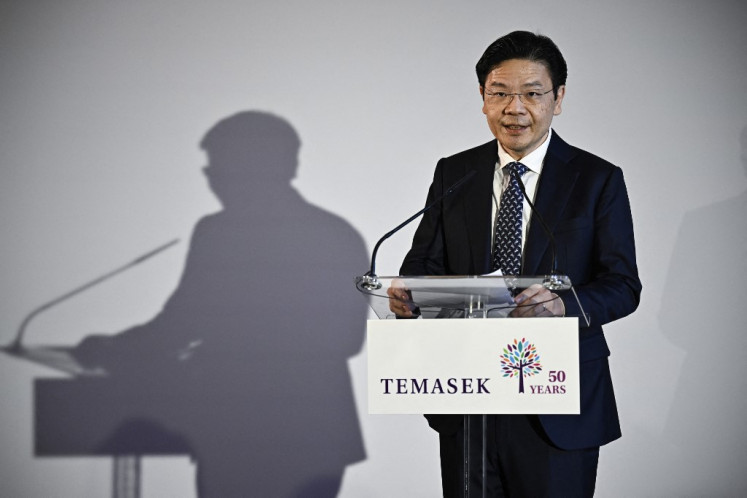Democratic Party in limbo, who is to blame?
Since Saiful Mujani Research and Consulting (MRC) released the outcome of its survey earlier this month, which ranked the Democratic Party third after the Golkar Party and the Indonesian Democratic Party of Struggle (PDI-P) in terms of electability, many within the ruling party have deemed their chairman Anas Urbaningrum as most responsible for this decline
Change Size

S
ince Saiful Mujani Research and Consulting (MRC) released the outcome of its survey earlier this month, which ranked the Democratic Party third after the Golkar Party and the Indonesian Democratic Party of Struggle (PDI-P) in terms of electability, many within the ruling party have deemed their chairman Anas Urbaningrum as most responsible for this decline.
As a consequence, they say, Anas must be replaced. The move to oust Anas has since been taken forward in several stages.
In the first stage, on Feb. 8, the party’s general assembly transferred the executive authority from Anas to the assembly chairman President Susilo Bambang Yudhoyono under the aegis of the “eight steps to rescue and consolidate the Democratic Party”.
The steps stipulate, among other things, that the supreme assembly chairman is responsible for leading the rescue and consolidation of the party, with the assembly taking all decisions, actions and direction of strategic importance, including restoration of the party’s credibility and integrity, and with all party elements directly answering to the assembly. Anas keeps his chairmanship intact, but must focus on the legal case he is facing.
If we read carefully the eight-item measure, it is clear this is the first step to dismantle the authority of Anas as the party chairman. He remains the deputy chief of the assembly, but his powers have been taken entirely by Yudhoyono. In other words, Anas has been stripped of his authority.
The second step is the release of “10-point integrity pact” that all ranks of party executives — both in the central board and regional chapters — must sign.
One of the points of the pact is a willingness to resign after being named a graft suspect. There is nothing new about this pact — it was part of the party’s code of ethics in the first place.
There was speculation that the pact was issued because Anas would have resisted it on the grounds that he was embroiled in a scandal centering on the misappropriation of state money in the construction of the Hambalang sports center in Bogor. In fact, Anas signed it.
The way Anas put pen to paper on the integrity pact showed he remained powerful and his leadership in the party was still very strong. This was evident when party executives loyal to him followed suit.
By asking all party executives to sign the pact, Anas displayed his integrity and sent a signal that he was still “in command”.
In that regard, Anas maintains effective leadership in the party. Borrowing the view of Joseph S. Nye Jr.: “An effective leader is a person capable of mixing between the hard power of coercion and the soft power of persuasion.” His ability to know when to use hard power and when to use soft power means that Anas possesses smart power.
In the 2004 and 2009 presidential elections, Yudhoyono displayed the soft power of persuasion. He was able to attract many people to accept and share his vision.
He also knew how to co-opt his followers to walk in step with him to achieve a common goal. The slogan “Together we can” was the motto with the magnetic power in the 2004 election, which he maintained in 2009.
However, lately it is his militaristic nature that appears to have prevailed over his democratic nature.
Yudhoyono’s move to control and consolidate the party he found is understandable only from a military perspective, as he seized the opportunity to save the party at the expense of Anas. Unfortunately, this scenario is far from perfect.
For example, “pressure” on Anas to focus on the legal case in which he is involved, which is being investigated by the Corruption Eradication Commission (KPK) apparently predates the law.
The leaking of a KPK letter to start a formal investigation into Anas as part of the pressure on the KPK did not work as not all of the antigraft body leaders signed it. It only gave the impression that the Presidential Palace had attempted to intervene. The Palace dismissed any link to the leaking of the document
Step number three of the war of attrition against Anas took the form of the party’s National Leadership Meeting on Feb. 17, which was expected to increase the pressure for an extraordinary congress to replace Anas, which would have been the fourth stage of the effort to unseat Anas.
As the public has witnessed, participants of the leadership meeting displayed no urge to organize an extraordinary congress.
If all the measures to dethrone Anas fail, the party’s supreme assembly has no other choice but to reinstate Anas’ powers as party chairman. A failure to do so will push the party’s electability rating down further because of the internal fuss about the party’s provisional list of legislative candidates to be submitted to the General Elections Commission (KPU) in March.
The crisis, if it happens, will certainly serve as a negative campaign for the ruling party. To consolidate the party, Anas’ authority may need to be restored.
If the infighting is prolonged, the party may fail to meet the 3.5 percent parliamentary threshold required to sit in the House of Representatives following the 2014 legislative election. If that occurs, the party will be consigned to the Indonesian political history books.
Is this the legacy that Yudhoyono will leave behind?
The writer is research professor at the Research Center for Politics at the Indonesian Institute of Sciences (LIPI), Jakarta.









